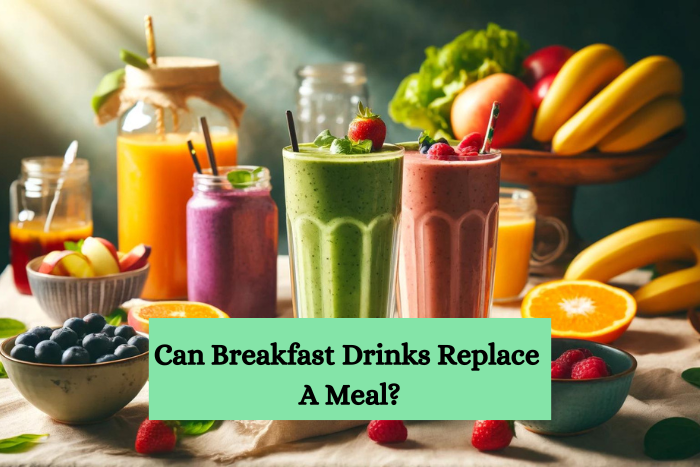- Nutritional Value: Breakfast drinks, when well-formulated, can rival or exceed the nutrients found in traditional breakfasts, offering a blend of proteins, vitamins, and minerals.
- Satiety Considerations: Liquid meals like breakfast drinks typically digest faster than solid foods, which may lead to earlier hunger cues.
- Convenience Factor: For those with busy mornings, breakfast drinks offer a significant time-saving advantage, requiring little to no preparation compared to cooking a full breakfast like pancakes or bacon and eggs.
- Nutritional Gaps and Variety: Although convenient, breakfast drinks often lack dietary fibers and the full spectrum of phytonutrients provided by whole foods.
- Making Healthier Choices: Selecting a breakfast drink involves considering nutrient density and avoiding high sugars.
Busy mornings and the rush to get out the door often mean breakfast is skipped or simplified. In this scenario, breakfast drinks advertise a quick, nutritious solution.
But can these liquid meals truly stand in for a traditional breakfast?
Understanding Breakfast Drinks: A Nutritional Overview

Explanation of What Constitutes a Breakfast Drink
Breakfast drinks are typically liquid or semi-liquid foods designed for quick consumption to kickstart the day. They vary widely, from nutrient-dense shakes to lighter, fruit-based smoothies.
These drinks are often fortified with vitamins and minerals and might contain added protein or fiber to boost their nutritional value. Marketed for their convenience, they are popular among those who may not have time for a sit-down breakfast.
Nutritional Content Comparison Between Breakfast Drinks and a Traditional Breakfast
The key is balance when comparing the nutritional content of breakfast drinks to traditional breakfast foods—such as eggs, oatmeal, or yogurt. A well-prepared breakfast drink can match or even exceed the nutritional offerings of some classic breakfasts, especially if it is carefully formulated.
For instance:
- Calories: Breakfast drinks can be calorie-controlled more easily, which is beneficial for those tracking intake.
- Proteins: Many drinks are high in protein, which is essential for muscle repair and growth throughout the day.
- Vitamins and Minerals: Fortified drinks can provide essential nutrients like Vitamin D, calcium, and iron, sometimes more efficiently than whole foods.
However, breakfast drinks often lack sufficient dietary fibers and the phytonutrients that come from whole fruits, vegetables, and grains found in traditional breakfasts.
The Role of Macronutrients and Micronutrients in a Balanced Morning Meal
Macronutrients—carbohydrates, proteins, and fats—are crucial for providing energy, supporting cellular functions, and maintaining overall health. Micronutrients, including vitamins and minerals, play key roles in body functions such as bone health, immune response, and blood clotting.
A balanced breakfast drink should ideally contain a thoughtful mix of these nutrients to support a person’s health and daily activities effectively.
Analysis of the Satiety Factor: Do Liquid Meals Keep You Full as Long as Solid Foods?
One significant difference between breakfast drinks and solid meals is the satiety factor. Solid foods generally take longer to digest, helping to keep you feeling full longer.
Liquid meals, while they can be engineered to be filling by adding fibers and proteins, often pass through the digestive system more quickly. This can lead to earlier hunger cues, which might not be ideal for everyone, particularly those looking to manage their weight or appetite.
Potential Benefits and Downsides from a Nutritional Standpoint
Benefits:
- Convenience: They are quick to prepare and consume, which is perfect for busy mornings.
- Controlled Portions: They help in managing and measuring intake, which can be beneficial for weight management.
- Nutrient-Rich: Properly formulated breakfast drinks can be packed with a range of nutrients in concentrated forms.
Downsides:
- Nutritional Completeness: They might not always provide a complete nutritional profile, especially in terms of fiber and whole food benefits.
- Psychological Satisfaction: Drinking a meal rather than eating it can be less satisfying for some, which might affect their enjoyment of food and overall satisfaction.
By understanding the nutritional dynamics of breakfast drinks compared to traditional meals, consumers can make informed decisions about incorporating them into their diets effectively. Whether a breakfast drink is suitable depends largely on individual lifestyle, dietary needs, and personal preferences.
Can Breakfast Drinks Truly Replace a Traditional Meal?

Examining the Convenience of Breakfast Drinks vs. Traditional Meals
Breakfast drinks are often lauded for their convenience, which is a significant advantage over traditional meals. For those with hectic morning routines or minimal time to cook, a breakfast drink can be a lifesaver.
These drinks are typically ready-to-consume or require minimal preparation, such as mixing a powder with milk or water. This ease greatly contrasts with the time and effort needed to prepare a traditional breakfast like scrambled eggs, toast, or oatmeal, which involves cooking and subsequent cleanup.
Discussion on Whether Breakfast Drinks Can Meet Dietary Guidelines
When it comes to meeting dietary guidelines, breakfast drinks can be both hit and miss. Many are designed to include a balance of nutrients, including carbohydrates, proteins, fats, vitamins, and minerals, which align with dietary recommendations.
However, they often lack sufficient fiber and can be high in sugars, which might not fully align with health guidelines aimed at reducing sugar intake and increasing fiber intake. Consumers need to scrutinize labels to ensure that the breakfast drink they choose aligns with their dietary needs and guidelines.
The Importance of Variety in a Diet and How Breakfast Drinks Fit In
Dietary variety is key to obtaining a spectrum of nutrients and preventing nutritional deficiencies. Relying solely on breakfast drinks can lead to a lack of variety in the diet, as these drinks may not provide all the benefits that whole foods offer, such as phytochemicals and other non-nutrient compounds that are beneficial for health.
While breakfast drinks can form part of a balanced diet, they should not be the sole component. Incorporating whole foods into other meals is crucial to ensure a well-rounded intake of all necessary nutrients.
Guidelines for Choosing a Healthy Breakfast Drink
Choosing the right breakfast drink involves more than just picking the tastiest or most convenient option. Here are some guidelines to help you select a healthier choice:
- Nutrient Density: Look for drinks that offer a good balance of essential nutrients, including proteins, healthy fats, and complex carbohydrates, without excessive sugars.
- Low in Added Sugars: Avoid breakfast drinks high in added sugars. The American Heart Association recommends limiting added sugars to no more than 6 teaspoons (25 grams) per day for women and 9 teaspoons (38 grams) for men.
- Whole Food Ingredients: Opt for drinks that use whole food ingredients over those with artificial flavors and preservatives.
Understanding Food Labels and Nutritional Claims
Food labels and nutritional claims can be a minefield of confusion, but understanding them is key to making healthier choices:
- Ingredient List: Ingredients are listed in order of quantity, so the first few ingredients are what the product mostly contains. Look for natural ingredients and be wary of long lists of additives.
- Nutritional Information: Pay attention to serving size and per-serving nutrients to ensure you’re not consuming too much, particularly when it comes to calories and sugar.
- Health Claims: Be skeptical of health claims that seem too good to be true. Claims like “low-fat” and “reduces cholesterol” can be misleading if the product is high in sugar or salt.
🌟 Nutritional Showdown: Breakfast Drinks vs. Traditional Meals 🌟 |
||
|---|---|---|
| Nutrient | Breakfast Drinks | Traditional Breakfast |
| Calories | 200-400 | 300-600 |
| Protein | 10-20g | 15-25g |
| Fiber | 0-5g | 5-10g |
| Vitamins & Minerals | Fortified with essential vitamins | Naturally occurring & varied |
| Brought to You by athomewithtai.com | ||
Expert Opinions from Nutritionists and Dietitians on Meal Replacements
Nutritionists and dietitians often express cautious approval of breakfast drinks as part of a balanced diet. They typically recommend these drinks for specific circumstances, such as for individuals who struggle to eat a nutritious breakfast.
However, experts emphasize that real food should always be the priority, and meal replacements should not become a long-term substitute for whole foods. They advise checking for high-quality ingredients and avoiding products with excessive sugars or artificial additives.
Case Studies or Testimonials of Individuals Incorporating Breakfast Drinks Into Their Diets
Testimonials from individuals who have incorporated breakfast drinks into their diets often highlight the benefits of convenience and simplicity, particularly for those with limited time in the mornings. For example, a case study might feature a busy professional who has replaced their irregular, often skipped breakfasts with a fortified drink, resulting in improved energy levels throughout the morning.
However, these testimonials also sometimes reveal the challenges of relying on liquid meals, such as recurring hunger or a lack of satisfaction that might lead to overeating later in the day. In conclusion, while breakfast drinks offer a convenient and potentially nutritious alternative to traditional breakfasts, they are best used to complement a diet that includes a variety of whole foods.
Their ability to completely replace a traditional meal depends on individual dietary needs, lifestyle factors, and personal health goals.
Suggestions on Making Your Own Breakfast Drink with Whole Food Ingredients
Creating your own breakfast drink can be a fun and healthy alternative to store-bought options. Here’s a simple recipe to get you started:
- Basic Smoothie Recipe: Blend 1 banana, ½ cup of mixed berries, 1 tablespoon of almond butter, 1 cup of spinach, 1 cup of almond milk or water, and a scoop of protein powder if desired.
- Customizable: This recipe is highly customizable. Add oats for extra fiber, swap in different fruits or greens, or use seeds like flax or chia for added nutrients.
By making informed choices and understanding the implications of incorporating breakfast drinks into your diet, you can enjoy the convenience they offer without compromising on nutrition. These guidelines will help you navigate your options and ensure that your diet remains balanced and healthy.
My Final Thoughts
Breakfast drinks can be a useful tool in your dietary arsenal, especially when you’re pressed for time or need a quick, nutrient-dense option. However, they should not be relied upon exclusively for nutritional needs.
Balancing these drinks with whole foods and considering your specific health circumstances are crucial to making the most out of your meals. How do you balance the convenience of breakfast drinks with ensuring a diverse and nutritionally complete diet, especially on busy mornings?
Let me know in the comments below!
FAQ

1. Can breakfast drinks replace a traditional breakfast?
- Yes, breakfast drinks can replace a traditional breakfast if they are well-balanced and contain adequate nutrients. They can be especially useful for those who are short on time in the mornings.
- However, while they can serve as a convenient alternative, they often lack the fiber and the variety of nutrients provided by a complete meal made of whole foods. It’s important to ensure that other meals throughout the day balance the diet.
2. Are breakfast drinks good for weight loss?
- Breakfast drinks can be beneficial for weight loss if they are low in calories and sugars and high in proteins and fibers, which can help keep you full longer and control your appetite.
- That being said, it’s crucial to check the nutritional label as some drinks can be high in sugars and calories which might not align with weight loss goals.
3. What should I look for when choosing a breakfast drink?
- Look for drinks that have a high nutrient density, meaning they should provide a good balance of macronutrients (proteins, fats, carbohydrates) and essential micronutrients (vitamins and minerals) with limited added sugars.
- Choose breakfast drinks that include whole food ingredients and avoid those with artificial flavors, preservatives, or excessive sweeteners. These choices tend to offer more natural and beneficial nutrients.
4. Can I consume breakfast drinks every day?
- You can consume breakfast drinks daily as part of a balanced diet, especially if they meet your nutritional needs and are convenient for your lifestyle.
- It’s important, however, not to rely solely on these drinks for all your meals. Including a variety of whole foods in your diet is essential to obtain a wide range of nutrients and to avoid potential nutrient deficiencies.
5. What are the potential long-term effects of regularly consuming breakfast drinks?
- Regularly consuming breakfast drinks as a meal replacement can be a practical solution for busy mornings, and if well-balanced, might not have negative long-term effects.
- Potential risks include nutritional gaps, particularly in fiber, and increased sugar intake if not carefully selected. Over-reliance on liquid meals can also impact digestive health and may lead to quicker hunger feelings compared to solid food meals.
- Why Are Breakfast Juices a Smart Choice?
- What’s the Best Beverage for Diabetics at Breakfast?
- What’s the Best Protein Drink for Your Morning Routine?
- Can Breakfast Drinks Really Boost Your Weight Loss?
- Ever Tried Turkish Coffee or Indian Lassi?
- Is Your Morning Drink Boosting Your Health or Calories?

I’m Diane, a culinary enthusiast who loves to share my cooking adventures and knowledge with you.
This blog is my cozy corner on the internet where I unravel the secrets behind making everyday cooking simple, enjoyable, and downright delicious.
Whether it’s unlocking the flavor potential in chicken or figuring out why your mashed potato cakes won’t hold together, I’m here to guide you through.
Join me as we explore various dishes, solve common kitchen dilemmas, and discover new recipes that will make you fall in love with cooking all over again.
Cooking is an adventure that’s best shared, so let’s get started!







